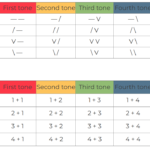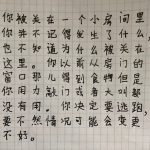Articles tagged with ‘Native speakers’
-
How to learn Chinese in the long term with intrinsic motivation
While strong motivation doesn’t necessarily accelerate your learning or improve your memory, without it you won’t spend enough time learning Chinese. So how can you stay motivated for months, years and even decades?
Read → -
Improving your Chinese pronunciation by mimicking native speakers
The best way to improve your Chinese pronunciation is to mimic native speakers. But why, and how exactly should you go about it?
Read → -
Are authentic texts good for learning Chinese or is graded content better?
Authentic texts not written specifically for second language learners are rich, varied, interesting and engaging, but they can also be terribly difficult and confusing. Should you use such texts for learning Chinese, or are you better off using content tailored to language learners?
Read → -
A smart method to discover problems with Mandarin sounds and tones
It’s often hard to assess one’s own pronunciation when learning Mandarin. People around you might understand what you are saying, but that doesn’t necessarily mean your tones are good. Simply asking people if your pronunciation is good won’t work either, because they will often tell you that your pronunciation is good even if it’s not. So how can you find out how good your pronunciation really is?
Read → -
36 samples of Chinese handwriting from students and native speakers
This article features 36 samples of Chinese handwriting. The same text was written by native speakers and students with varying backgrounds and time spent learning Chinese.
Read → -
Two reasons why pronunciation matters more than you think
Good pronunciation matters, whether you like it or not. In general, students (and teachers) tend to stop caring about pronunciation much earlier than they should. You don’t need to aim for native-like pronunciation, but clear and easily-understood Chinese should be the goal of all students. In this article I present two arguments: one about the fact that pronunciation and communication are closely linked, one about how pronunciation reflects both you as a person and your other skills.
Read → -
You might be too lazy to learn Chinese, but you’re not too old
Children learn languages neither quickly nor effortlessly, but there’s still a lot we can learn from them. You might be too lazy, but you’re definitely not too old to learn Chinese.
Read → -
The question you have to ask about your Chinese teacher or course
The most important question you should ask yourself about your current teacher or course is what you won’t learn. Since this isn’t something most teachers and schools like to talk about, it’s typically something you need to figure out on your own. This article discusses this question from various angles, highlighting the importance of being aware of what you need to study on your own.
Read → -
You shouldn’t walk the road to Chinese fluency alone
The road to Chinese mastery is long, but fortunately, you don’t have to walk it alone. This article describes four different kinds of people and how they will help you to master Chinese: the local, the traveller, the supporter and the guide. They all have their different strengths and you should learn what they are in order to make the journey as smooth as possible.
Read → -
You can’t learn Chinese characters by rote
My conclusion after years of learning characters is that rote learning is useless. Spaced repetition software is good, but it’s still not enough. If adult foreigners are going to learn to write Chinese by hand, we really need another method. We need mnemonics, we need active processing, we need to quit rote learning and stop using SRS mechanically.
Read →









